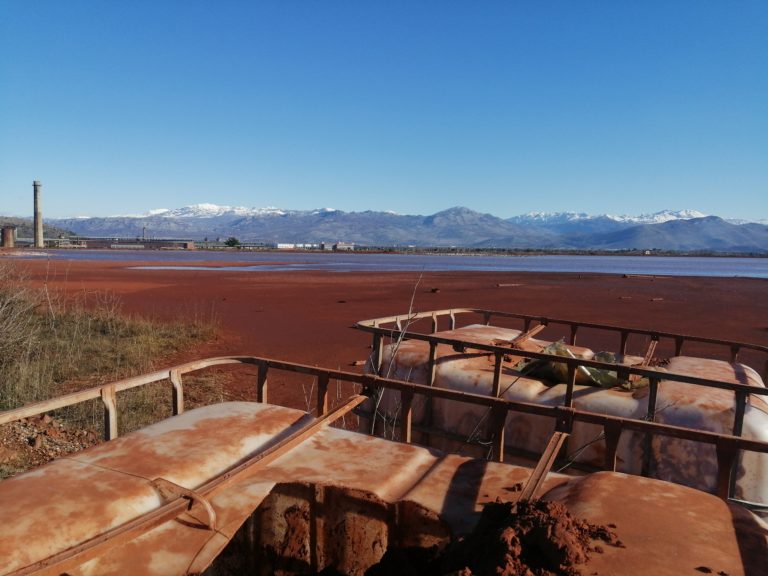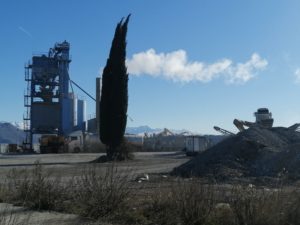In Montenegro Environmental Inspectors Lack Teeth to Enforce Law

Small fines and a reluctance to pursue criminal prosecution have contributed to a culture of impunity for companies big and small that ignore the orders of environmental inspectors.
By Jelena Jovanovic
On November 7, 2013, environmental inspectors in Montenegro ordered local wine producer 13. jul-Plantaze to resolve the way it treats wastewater.
Two years later, having failed to comply, the company – which produces roughly 22 million kilos of grapes annually – was given a fine of 3,000 euros and a new deadline. When that deadline was missed, it was fined again, this time 4,000 euros. By December 2016, the fine was 5,000 euros, repeated in July 2017 and then again in February 2019.
And still the company, which claims to sell more than 16 million bottled products in over 40 countries around the world, did not comply with the order.
“The company has prepared project documentation for the wastewater treatment system, but large financial resources are needed to carry out the measures that have been ordered,” said chief environmental inspector Veselinka Zarubica.
13.jul-Plantaze said it had worked “intensively” on the issue and was waiting for “a stable financial situation” to resolve it.
“The whole time work is going on to optimise the solution for purifying wastewater, in order to find the most efficient and effective means of dealing with it,” the company said.
It is far from alone, however, in failing to act immediately on the orders of environmental inspectors in Montenegro, who rarely escalate cases beyond misdemeanour proceedings, according to the finding of an analysis by BIRN and the Centre for Investigative Journalism in Montenegro, CIN CG.
And it’s the water, land, air and people of Montenegro that are paying the highest price, say environmentalists.
“We have hundreds of examples that prove that the laws are just words on paper and that the system does not work”, said eco activist Aleksandar Dragicevic.
Fines having little effect
According to data obtained from the Judicial Council, since the beginning of 2016, 534 cases have been opened in Montenegrin courts on the basis of alleged criminal acts against the environment and spatial planning.
But 411 of those concerned illegal wood-cutting; only six were for environmental pollution, none of which ended in convictions.
Instead, the Department for Environmental Inspection relies heavily on fines and misdemeanour proceedings, which carry far less damaging consequences for the guilty party.
In the records of dozens of misdemeanour cases that BIRN obtained via Freedom of Information requests, the biggest violators, besides Plantaze, are Gradir Montenegro, owner of the Suplja stijena lead and zinc mine in Pljevlja, scrapyard WEG kolektor D.O.O. Berane, the steel mill Toscelik Steel and state-owned electricity firm Elektroprivreda.
In many cases, the issues identified by inspectors have not been resolved regardless of the fines imposed.
In 2015 alone, Zarubica filed five requests for misdemeanor proceedings against Turkish-owned Toscelik, based in Montenegro’s second city of Niksic.
In March of that year, Toscelik was ordered to obtain environmental consent from the Agency for Environmental Protection for an environmental impact assessment for part of its operations. When it failed to do so, Zarubica filed for misdemeanour proceedings in June. Then again in October. She filed three more requests in December for other shortcomings, including one concerning the way the factory deals with waste.
Then three years later, in January 2018, Toscelik was reprimanded again for violating the law on integrated pollution prevention and control, according to documents obtained by BIRN and CIN CG. The company ceased operating in 2021.
Likewise, between 2017 and 2019, WEG Kolektor was fined repeatedly over its handling of toxic waste, including failure to measure pollution in the air. In May 2017, inspectors ordered the company to dig a third well for waste, only to find two years later that it had not.
In documentation handed over to state prosecutors on November 6, 2018, the Agency for Environmental Protection complained that “none of the steps taken so far by environmental inspectors concerning the subject under monitoring have had any effect.”
Meanwhile, Gradir Montenegro was ordered in September 2013 to fix pipes at its lead and zinc mine that inspectors discovered were leaking into the Mjednik stream and turning the water cloudy, as well as a faulty pump. The company was ordered to fix the pipes, which it did.
Six years later, the Cehotina river, into which the Mjednik flows, was polluted. Authorities were unable to prove that Gradir caused the pollution because officials from the Institute for Public Health failed to turn up to take water samples on November 15, 2019, according to records made by environmental inspector Irena Popovic and seen by BIRN and CIN CG. Gradir was ordered to remove the pipes altogether.
Dragicevic, the eco activist, said smaller polluters were only following the example set by bigger polluters.
He called for a proper penal policy, law enforcement and reform of the inspection system, warning that “trust in the institutions must be built before it is too late.”
“Because when we reach a point of no return, when anyone can kill what they want with a rifle in the woods, when tons of fish are killed with dynamite every day, when the forest is cut by whoever wants to, wherever they want, without fear of consequences soon we will have nothing to protect and it will be too late.”
‘Nothing but devastation’
Radojica Bulatovic says that the very air he breathes is affected by the failure of authorities to hold polluters to account.
He and other residents near the Cijevna river in Golubovci, southern Montenegro, blame the road contractors Putevi and Tehnoput for the dust in the air and excrement in the river, which both companies scrape for gravel.
“They take the state’s treasures and these people produce asphalt using such outdated technology that they poison us. They are killing us with stone dust,” said Bulatovic.
He accused inspectors of “resolving everything over the phone” and questioned the effectiveness of the “ordinary, small sprinklers” installed to keep down the dust. “If they continue like this, we’ll have to move out,” Bulatovic told BIRN and CIN CG.
Residents say they have appealed to the Directorate for Inspection Affairs on several occasions. Two years ago, the directorate replied that both companies had the necessary permits, had installed water systems to keep down dust and that one of the firms had even planted a “small pine wood” to stop the spread of dust.
In a response to BIRN and CIN CG, the Directorate said that its inspectors “regularly monitor the companies Putevi and Tehnoput” and that, in response to the concerns of residents, had repeatedly ordered monitoring of air pollution in the air and that Tehnoput would be relocated.
To make matters worse, major polluters in Montenegro have been dodging environmental taxes and contributions for years.
For example, Niksic-based Uniprom, which owns aluminium producer Kombinat Aluminijum Podgorica KAP, was ordered this year to pay just over 800,000 euros in unpaid environmental taxes and fees. On November 25, Uniprom owner Veselin Pejovic was arrested on allegations he threatened the head of the Agency for Environmental Protection. By then, Uniprom had paid some of the money back but still owed just over 670,000 euros.
In total, the Agency ordered firms to pay around 1.3 million euros in taxes and fees this year, a sum that included debts from previous years. Around half that amount had been collected by the time of publication of this story, compared to roughly 300,000 euros annually in previous years.
Milos Lazarevic, executive director of the NGO Coalition for Sustainable Development, KOR, said that a raft of international conventions and agreements that Montenegro had signed up to, not to mention its obligations on the road to European Union accession, had little effect.
“To make matters worse, the previous government concluded a number of agreements that are unconstitutional and passed a series of urban and other plans that would permanently devastate even UNESCO-protected areas, not to mention rivers and lakes,” Lazarevic told BIRN and CIN CG.
“In the absence of a system of rule of law, some citizens pointed out anomalies in society through organised action and thus inspired others to jointly put pressure on the institutions of the system to finally start doing the work for which they are paid from the citizens’ money,” he said.
“There is a critical awareness and desire among the citizens, but as long as the legislative, executive and judicial authorities do not realise that the emperor is naked and do not take responsibility… in ten years there will be nothing but devastation.”




